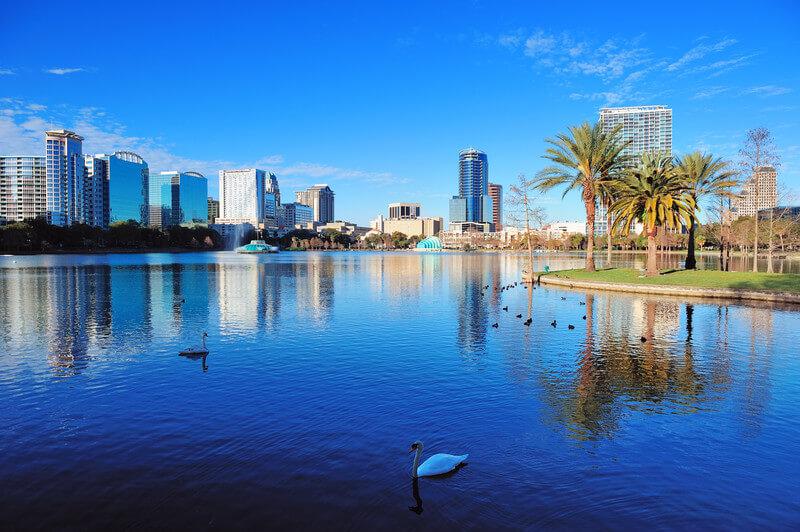Pricing Van Lines goes into the dirty details of life in Orlando, FL. We go deep into the actual numbers of the daily things you will need so you can accurately asses what life will cost you here post relocation plans.
Living in the city isn’t cheap, but with the proximity to Disney Land you can enjoy every moment while keeping on budget.
Disney World and More
Living in Orlando, Florida, gives you a great combo of affordable living, diverse and interesting cultures from around the g;pbe, and access to world-famous attractions. However,, the cost of living can vary greatly depending on your lifestyle, housing, and personal fun spending. Below is a breakdown of the cost of living in Orlando, followed by some top tips for saving money here locally, and a few questions about moving to Florida.
Cost of Living Breakdown in Orlando:
1. Housing
Housing is always the most significant expense no matter where you go. You have to live somewhere ay? In Orlando, the cost can vary depending on the neighborhood you like and type of housing you choose.
- Rent: The average rent for a one-bedroom apartment in downtown Orlando is around $1,500 per month, while outside the city, it is closer to $1,200. The city life adds convenience and living here might make you able to ditch the private car which would be a huge savings depending on where your work is located.
- Two-bedroom apartments range from $1,800 to $2,300 rental, depending on the location and features.
- Buying a Home: The American dream will cost you around $380,000, though this will vary based on location and property type. You have everything from mansions with seafront pools to the slums of Orlando so prices obviously vary. This is based on a 3 bedroom home in the city.
- Property Tax: Florida’s property taxes average around 1.03% of a home’s value, slightly lower than the national average.
2. Utilities
Utilities in Orlando, which include electricity, heating, cooling, water, garbage, and sewer, cost an average of about $150–$200 per month for a standard apartment. The AC does run a lot of the year which is important to account for.
- Electricity can be higher during the hot summer months especially.
- Water/Sewer/Garbage is typically around $80–$150, depending on usage.
3. Food and Groceries
Orlando’s grocery prices are average for Florida. Here are some estimated monthly grocery costs for a single person in Orlando:
- Groceries: Expect to spend about $300–$400 per month on groceries for one person without a special diet buying from a chain grocer.
- Eating Out: A basic meal at an cheap restaurant will cost around $15–$20, and mid-range restaurants around $30–$50 per person, excluding drinks and tips.
4. Transportation
Orlando is a car-dependent city, though it has a public transportation system operated by LYNX, the local bus service. If your whole life is centered around the city center you can get by without a private car bu if you are even partially in the suburbs, don’t rely on the buses.
- Gas: Gas prices in Orlando are generally in line with the national average, fluctuating around $3.50–$4.00 per gallon.
- Public Transportation: A monthly bus pass costs about $50. Most people outside the city center need a private car.
- Car Insurance: The average cost of car insurance in Florida is higher than the national average, with monthly premiums around $150–$200, depending on factors like driving record and the vehicle. This is one thing that is more expensive locally.
5. Health
Health Insurance: The average monthly cost for individual health insurance in Florida is approximately $300–$400 for a basic plan. Costs can vary greatly based on the level of coverage, age, and whether or not you qualify for Medicaid. Since FL is seen as the retirement capital of the US there is great elderly care options that come at a pretty penny.
6. Fun in the Sun
Orlando is a major tourist hotspot, so entertainment options can range from free in nature to quite expensive in the best theme parks.
- Theme Park Tickets: Tickets to Walt Disney World or Universal Studios cost around $120 per day for a single park pass, depending on the time of year. Annual passes and multi-park passes are available but still relatively costly. You can save by going to the rollercoaster area every week!
- Gym Membership: A basic gym membership in Orlando will cost about $25–$60 per month, depending on the quality of gym.
- Sailing: A boat club membership which is quite common here runs about $450 a month for once a week skipper lessons and sailboat rentals.
7. Childcare and Education
- Daycare: The cost of daycare in Orlando varies widely but averages around $700–$1,200 per month for full-time care at a daycare.
- Public School: Florida does not charge tuition for public K-12 education.
- Private Schools: Private school tuition in Orlando can range from $6,000 to $20,000 per year, depending on the school.
Top Tips for Saving That Moola in Orlando
1. Living Outside the City Center
The best way to save for living in Orlando is living outside Orlando as funny as that sounds. Housing costs in Orlando can be expensive, particularly downtown. Consider living in the suburbs or neighborhoods like Winter Park, Altamonte Springs, or Lake Mary, where rent and homes are lower priced. You wil be close to the city without the price tag.
2. Avoid Theme Park Crazies
While Orlando is famous for its theme parks, you don’t need to visit them all the time despites what your kids would argue. Take advantage of Florida resident discounts and limit the number of visits as this gets expensive fast. For cheaper or even free alternatives, you can also explore other attractions like parks, lakes, and hiking trails.
3. Use Public Transportation
If you can manage without a car, Orlando’s bus system is an affordable option. It’s much cheaper than maintaining a car with the high costs of parking locally.
4. Grocery Shop Smart
Save money by shopping at local markets and discount grocery stores like Walmart or Aldi will really add up. Meal prepping and cooking at home instead of dining out will also make for a huge local savings.
Orlando Wraps Things Up Pretty
Overall, Orlando, Florida offers a relatively affordable cost of living compared to many other major US cities, with housing being one of the most significant expenses here if you choose to live in the city center.
By considering factors such as location, transportation, and lifestyle fun choices, you can live in Orlando without breaking the bank and enjoy the beaches every day.
If you want a great partner in the field to make moves with you towards being neighbors with Disney then Pricing Van Lines is here to make you smile without entering the “Happiest Place on Earth.”
Frequently Asked Questions
What is the average cost of living in Florida compared to other places?
Florida’s cost of living is lower than California, New York, and Hawaii, but higher than the national average. That means it isn’t a cheap option but you can find ways to save. Housing is usually more expensive in cities like Miami and Orlando, but savings on other expenses make up for it. For the FL lifestyle the cost of living is worth it.
How do property taxes work in Florida?
Florida’s property tax rate is low compared to other states, with the rate around 1.03%. This rate is subject to change.
What are the best neighborhoods in Orlando to live in?
It depends on what you are looking for from parties to a quiet life on the lake, but some of the most popular neighborhoods in Orlando are Lake Nona for families, Winter Park for an upscale, vibe, and Downtown Orlandofor those career focused nightlife lovers. Each has its own appeal.
Are there state taxes in Florida?
Florida does not have a state income tax, which makes it an perfect destination for many people to move their businesses here to save. Itt does have a sales tax of 6%, which can increase slightly depending on local laws but overall nationally isn’t bad.
What are the best ways to save on utilities in a hot place like FL?
Energy bills can spike in Florida’s summer due to air conditioning needs. To save on electricity, try using energy-efficient appliances, seal your windows and doors to prevent AC loss, and using fans to move the air so that your AC won’t always be turned on. Additionally, consider signing up for budget billing programs with your utility provider to spread the cost evenly throughout the year.




